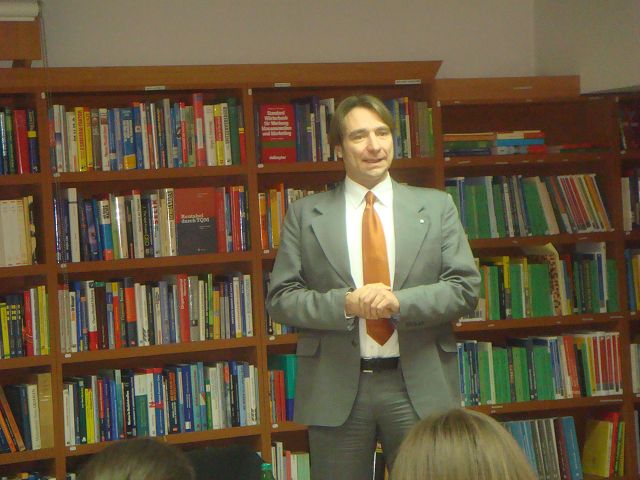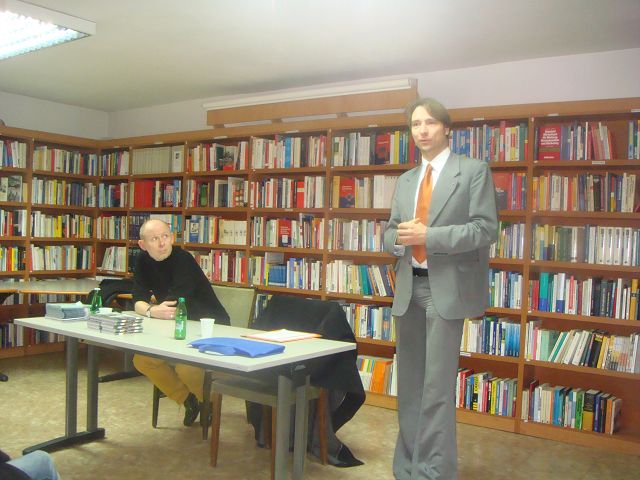
Wagner: “Germany made peace with the wartime enemy.
Balkan Diskurs had the opportunity to meet the spokesperson of the German Embassy, Jens Wagner, to discuss a variety of issues, including the German experience in rebuilding after World War II (WWII), the importance of memorials in preventing conflicts and the potential resources available in Bosnia-Herzegovina.
Commenting on the German experience in the aftermath of WWII, Wagner noted that it is not possible to draw many parallels between post-war situations in Bosnia and in Germany, partly because, in the case of World War II, there was a clear consensus regarding who had started the war and who had been the victims. Additionally, the Cold War and the subsequently high levels of international involvement dominated Germany’s experience. He notes that Germany’s successful reconstruction can be attributed, in no small part, to the nation’s reconciliation with Germany’s wartime enemies. In achieving this reconciliation, Germany pioneered the approach by which reconciliation is done between societies as a whole, based not only on politics but also on people. Another important aspect of Germany’s post-war society was confronting the past and taking responsibility for the atrocities of WWII. This process began relatively late and ultimately required subsequent generations, such as the student revolt of 1968, to force older generations to confront the past.
When asked about the importance of memorials in preventing conflicts, Wagner commented that such monuments are a strong statement made by society because they show which parts of history the society wants to remember. In some cases, the establishment of a memorial can be a strong gesture that keeps conflict alive; in others, it may be a gesture that builds bridges and facilitates reconciliation. Nowadays, war memorial sites typically commemorate all those who died in the war regardless of the side they fought on. Germany has demonstrated a significant commitment to building memorials in memory of the Holocaust and other atrocities committed by Nazi Germany. Such gestures shape the current discussion and make it clear that a society accepts responsibility. This message is especially visible in the placement of Berlin’s Holocaust memorial: located directly next to the political center of the city, the memorial represents a joint initiative of government and civil society.

Wagner emphasized the great potential of Bosnia, particularly in the areas of reconciliation and economic development, but noted that realization of the potential is strongly connected with education. The educational system in Bosnia often does not try to bridge ethnic diversity; on the contrary, it further accentuates ethnic differences. The most famous example of this is the “two schools under one roof” system, wherein students are separated according to their ethnicity and they attend different classes. Wagner expressed interest in seeing more exchanges in the education sector, both between Bosnia and the rest of Europe and within the country. Such an internal education exchange program would confront the problem whereby young people grow up without any contact with other entities, a situation that limits possibilities for meaningful reconciliation.
The German government is active in Bosnia through the Embassy, as well as organizations such as the German Development Cooperation (GIZ). The Embassy is involved in a variety of smaller-scale reconciliation projects that endeavor to build a common future, including support for the Cinema for Peace Foundation. Through this project, survivors from Srebrenica were interviewed for a genocide library of video testimonies. Other Embassy projects focus on the education sector, such as a high school exchange program through which 550 high school students from Bosnia will travel to Germany until the end of the school year 2014/15. For many of these students, this exchange program provides a new perspective about themselves and their homeland: in Germany, where few understand the distinction between the Republika Srpska and the Federation of Bosnia and Herzegovina, the students are simply perceived as Bosnians. The embassy is also currently planning a youth conference scheduled for the end of June where 100 youth from Bosnia, Europe and the United States will gather in Sarajevo. The Embassy also sponsors numerous projects dealing with minorities, especially with the Roma minority. Projects in Mostar include an effort to bridge the two halves of the city through music: youth from both the Bosniak and Croat sides are encouraged to play rock music together and to form multiethnic bands. Also in Mostar, the Embassy sponsors a Model United Nations project that brings together students from universities from both sides.
As our conversation drew to a close, Wagner commented on the protests in Bosnia. For him, it “is very understandable that there is a high level of frustration. We believe that part of life in a democracy is that citizens demonstrate and express their opinions through protest, so we hope that politicians in all parts of the country will really take these demonstrations as a wake-up call and try to find ways of initiating dialogue with the protesters. We believe that politicians here really have the responsibility to compromise more than they have so far. I hope that the pressure of the streets will force them to do more, however, we also want to emphasize that it is important that all these protests have to be peaceful and there is no sympathy for violence. I hope that from now on, we will not see any wild outbreaks because that certainly does not help the demonstrators in their cause.”





